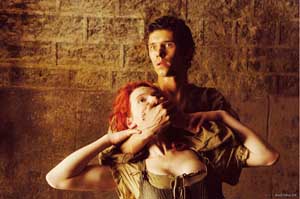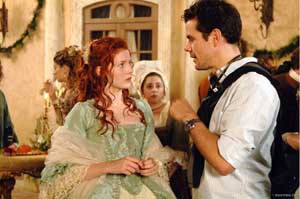-
- Proposed same-sex marriage ban advances in Mass.
- Lesbian’s patience pays off with new DP benefits
- Former general backs ‘Don’t Ask, Don’t Tell’ policy change
- The next step: Big fetes or small affairs for same-sex couples?
- Club that supports gay and lesbian teens meets hostility in Okeechobee
- Lawrence considers gay and lesbian partnership registry
- National News Briefs
- World News Briefs
Arts & Entertainment
Heaven scent
Director Tom Tykwer on the sweet smell of cinema
Published Thursday, 04-Jan-2007 in issue 993
The director asked, “Can we continue talking about other movies?” Tom Tykwer was in San Diego nursing a cold on one of the 15 days in the year that it rains. Out promoting Perfume: the Story of a Murderer, Tykwer just didn’t seem up to fielding yet another question about his latest film.
If he wanted to talk movies, he came to the right interview. The first film Tykwer remembered seeing was Disney’s Peter Pan, but what was the first film in which he realized that the actors didn’t make up the dialogue as they went along?
King Kong, said the German-born filmmaker without hesitation. “It has been the decisive experience for me in my life about film,” he explained. “I was 10 and I realized this was manufactured. Not to a degree that I really understood what it meant, but there was a craft behind it and people creating it. I just saw it a half a year ago and I’m still excited by it.”
Based on the novel by Patrick Süskind, Perfume: the Story of a Murderer tells the tale of young Jean-Baptiste Grenouille (Ben Whishaw), abandoned on the streets of Paris and blessed with remarkably refined olfactory glands. Even amidst the stench of a squalid fish market, Grenouille can sense a flower blossoming blocks away.
Sold into servitude at the age of 13, he is sent to town alone for the first time to run an errand. Stopping before a shop window, Grenouille spies what will become the object of his obsession: a bottle of perfume. Before long he is working alongside world-renowned perfumer Giuseppe Baldini (Dustin Hoffman) to concoct the ultimate in aromatic aphrodisia.
Grenouille quickly discovers that the most enthralling scent he has ever experienced is the natural fragrance of beautiful young women, and the only manner in which to preserve that essence will require murder. Lots of murder!
Not since Michael Powell’s Peeping Tom, in which the hero affixes a mirror to his movie camera so his victims are forced to watch their own demise while he rolls films, has there been such an inventive take on a Jack the Ripper-style psychopath.
“Peeping Tom is quite an important film in terms of the amount of influence it had,” Tykwer said while reaching for his teacup. “Always, when I see it again, I have to admit that I find it utterly repulsive. It’s disgusting to watch, but so fascinating.
“I think we’re in quite different territory here,” he continued, shaking his head. “We’re doing a very dark romantic tale and we don’t have someone who has a very strong neurosis.”
He’s right. In Peeping Tom, the killer’s relationship to the murders is completely abstract; he considers his victims as part of his beauty sculpture.
Summing things up, Tykwer noted, “My character doesn’t know that he’s doing something morally bad.”
The goal was not to make a film about an unlikable character. “We wanted you to root for the character, care for the character, actually like him,” Tykwer said. “By the time [Grenouille] starts killing, you are already so locked in with him that you don’t know what to make of him now that he’s suddenly fucking up all your morals.”
Leaning across the table, Tykwer said: “I do know what it means when somebody is longing to be recognized and ultimately loved and therefore creates a disguise for himself that will finally attract people to him. We all suffer from a lack of attention, but what kind of attention [do] we really long for?”
When the topic turned to adaptation, Tykwer provided some backstory concerning Peter Süskind’s novel, upon which his film is based. “In Europe it’s been quite a success, selling something like 15 million copies. It’s become one of these books that people live for, which is really quite disturbing when you think about it.”
This was Tykwer’s first period film, and there’s not a shot that doesn’t invite your eyes to roam the frame in search of new information. How did the man behind the high-octane Run, Lola Run tackle an 18th century costume picture? “For me,” he said, shaking his head again, “most period films have a tendency to be a bit slow. They lack life. I wanted to make a film where you are thrown by brute force into the period.”
Authenticity was the key, even down to the smallest detail. “I wanted actors to really know the jobs they’re doing in the background,” he said. “I wanted them to wear the clothes for days to give the feeling that they lived with this stuff. It also makes the period come alive.
“From a climate point of view,” he continued, “we were trying to reach out for Technicolor colors.”
A lot of the film’s color grading was done with Digital Intermedia (DI). “It’s a new technology that allows you to sit in front of a big screen and pick every single color inside every single frame and enhance it,” Tykwer explained.
The director marveled as he spoke of Scorsese’s commanding use of the digital palette in The Aviator. “They used the DI to imitate Technicolor. They even copied the mistakes, like the blue peas. I love that!”
For a film called Perfume, the only scent you’re likely to imagine is one of dirt and squalor. Tykwer giggled at the irony. “The reality of 18th century street-life was just a nightmare,” he said. “People were wading in mud, stinking like hell and there was no sewage system. People died, on the average, at 38 or 39. There was illness everywhere. To get that across, we had to do a lot of research. We built the sets and shot it as if it was actually happening.”
As though acting on orders to keep Mr. Tykwer thoroughly hydrated, a waiter interrupted us to rearrange the numerous cups and water bottles on the table and deposit a fresh teapot. After chuckling about all the liquids, Tykwer continued, “The film [Perfume] is always in a constant state between irony and tragedy, intertwining the two systems.”
It ends in a flurry of sexual activity that caused one critic to snipe, “What is this, Woodstock?”
Smiling, Tykwer said: “I find it such an interesting, overwhelmingly surprising and at the same time completely logical conclusion of the story. It is exactly what he was working toward. What’s the surprise?”
I felt obliged to correct a mistake the director made on a local morning news program where he erroneously credited schlock king William Castle as the man behind Scent of Mystery, presented in that never-duplicated technological sensation, Smell-O-Vision. It was actually the brainchild of producer Mike Todd, whose process choreographed various fragrances, pumped into theater ventilation systems, with onscreen action.
With marketing an ever-prominent part of the deal, did any perfumers come forward with a new bouquet to vend?
Tykwer rolled his eyes a bit before answering. “Thierry Mugler,” he said. “They have created something completely absurd. It’s a coffin filled with 15 perfumes … based on the film. They’re not beautiful smells, rather smells that represent the film.”
He pauses to stick out his tongue and shake a bit. “There’s one called Fish Market that smells like a nightmare. There’s also Sweat and Orgy. It’s a bit like the Smell-O-Vision idea, disgusting and attractive at the same time.”
|
|
Copyright © 2003-2025 Uptown Publications



